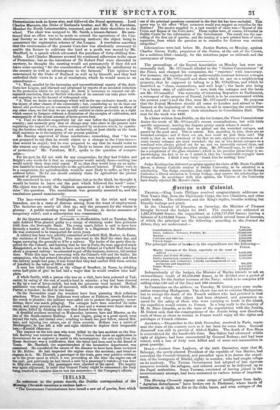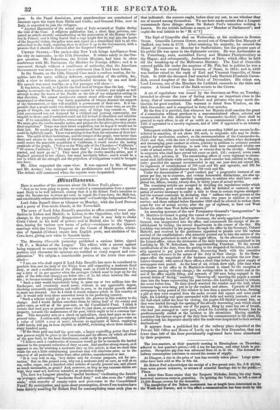,foreign an eolontal.
Foaafee.—King Louis Philippe received congratulatory addresses on New Year's Day, from the Diplomatic Corps, the two Chambers, and other public bodies. The addresses, and the King's replies, breathe nothing but friendly feelings and peace.
Francs.
Contributions, direct 5,000,000 Ditto, indirect—Tobacco, Powder, Ike 19,000,000 Stamps 1,000.000 Customs and Salt-tax 2,000,000 French Sugar 7,000,000
The principal items of increase in the expenditure are the following—
Francs.
Marine (increase of the Navy, especially on the coast of
Africa) 8,000,000 Justice and Public Worship 2,640,580 Public Instruction (salaries of teachers and officers) 1,141,885 Agriculture and Commerce (chiefly encouragement of ex- periments and inquiries) 606,870 Public Works 2,450.000 War 2.765,050
Independently of the budget, the Minister of Marine intends to ask an extraordinary credit of 93,100,000 francs, to be divided over a period of seven years, for the further increase of the Navy; which is to comprise 270 sailing-ships (40 sail of the line) and 100 steamers.
In Committee on the address; on Tuesday, M. Guizot gave some expla- nation respecting Madagascar. The oltect was not to colonize Madagascar, but to avenge the death of the French soldiers who had perished in that island; and when that object had been obtained, and guarantees se- cured for the safety of those who were carrying on trade in the island,
the expedition would return to France. In a long reply to the inquiry of M. St. Marc Girardin, as to the state of the negotiations with the Jesuits, M. Guizot said, that the congregations of the Jesuits being now dissolved, such of them as chose to remain in France would enjoy all the rights and privileges of French citizens.
Atoznia.—Despatches to the 25th December, received in Paris, repre- sent the state of the country such as it has been for some time. General
Joussouff was still in pursuit of Abd-el-Kader. The death of Bou-Maza is contradicted for the hundredth time. Ben-Salem had advanced within sight of Algiers; had been encountered by General Bedeau ; and had been routed, with a loss of forty men killed and of arms and ammunition in great quantity. IrAtx.—Letters from Leghorn, of the 24th December, state that M. Belzoppi, the newly-elected President of the republic of San Marino, had
convoked the Council-General, and prevailed upon it to decree the expul- sion of the insurgents of Rimini, eighty in number, who had sought refuge on its territory. The Tuscan Government had adopted of late rigorous measures towards the refugees, and ordered several to be delivered up to the Papal authorities. Some Tuscans, convicted of having joined in the insurrectionary attempt, had been sentenced to various terms of imprison- ment.
The Morning Chronicle repeats some scraps of intelligence from Italy. " Agrarian disturbances" have broken out in Piedmont; where bands of incendiaries, at night, set fire to the ricks, barns, and even cottages of the In the Chamber of Deputies, on Saturday, the Minister of Finance brought forward the budget for 1847. The receipts are estimated at 1,337,870,680 francs; the expenditure at 1,334,717,018 francs; leaving balance of 3,153,662 francs. The receipts exhibit several items of increase, of which the principal are the following: according to the Journal del Debate, they are understated—
poor. In the Papal dominions, great apprehensions are entertained of descents upon the coast from Malta and Corfu; and General Prim, now in Italy, is expected to join the refugees. " Another illustration of the actual state of Italy occurred at Naples during the visit of the Czar. A religious publication had, a short time previous, con- tained an article severely animadverting on the persecution of the Roman Catho- lics in Poland; and it being feared that a copy might find its way, into the hands of the Imperial visiter, the police were sent round on a domiciliary visit to all who subscribed to the work, requiring them to deliver it up to the Government, with a promise that it should be restored after the Emperor's departure."
UNITED STATES.—The packet-ship New York brings intelligence from the city its namesake, to the 17th. December. It relates solely to the Ore- gon question. Mr. Pakenham, the British Minister, had been in close conference with Mr. Buchanan, the Minister for Foreign Affairs; and it is rumoured, though without a semblance of authority, that the American Government was more disposed to a settlement than it had been before.
In the Senate, on the 15th, General Cass made a curious motion, for in- quiries into the navy, military defences, organization of the militia, &c., with a view to defence against apprehended invasion by sea and land. His speech was most warlike; as a few passages will show— It was better, he said, to fight for the first inch of Oregon than the last. "Our destiny is onward—its Western movement cannot be resisted; you might as well attempt to stay the waves of the Pacific as the tide of our emigration setting in that direction. We cannot recede—we cannot stand still—oar claim must be maintained or abandoned. Our hardy population of Oregon demand the support of the Government, or they will establish a government of their own. It is im- possible that a people under two distinct governments at the same time, as are the people of Oregon, can under the existing state of things long remain so. This joint government was not designed for a civilized and growing community, nor adapted to them; and if continued could not fail to lead to bloodshed and intestine war. If we can neither, therefore, retrace our steps nor check them, we must go on. We must give the twelve months notice, and prepare for the alternative that awaits their expiration." Texas was their latest acquisition, but he hoped it would not be their last. He would go for all future extensions of their general area where they could be rightfully made. There was nothing to fear from the extension of their bor- ders. The spirit of their institutions, and the temper of the people, were better than fleets and armies to the security of internal concord; and if this Administration could secure the peaceable acquisition of California, it would receive the lasting gratitude of the people. [Voices on the Whig side of the Chamber—" California"; gratitude
course, California"; " We must have that"; " And then Cuba"; " We have started, and must go on.") They must give the twelve months notice, and if England persisted in her claims, war must inevitably follow; and it would be a war in which all the strength and the prejudices of both nations would be brought into force.
Mr. Allen supported the same view. It was opposed by Mr. Mangam and Mr. Archer; who enlarged on the profitlessness and horrors of war. The debate still continued when the reports were despatched.



























 Previous page
Previous page